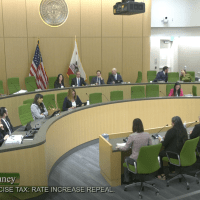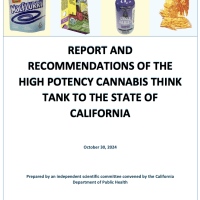![]()
Cal NORML put out word through our email alert list this week asking cannabis consumers and businesses to tell us about the initial impacts of the 26% excise tax increase that hit cannabis in California on July 1. Several consumers and businesses reported damaging repercussions; some of the responses are below.
“To be honest even the old tax had me wanting to go back to the black market but with the new tax it’s even more likely that I will start looking to get my cannabis from some place cheaper,” wrote one consumer. Another wrote, “I drive to Oregon to buy it instead. I’m retired on an extremely small income.” A man from Yolo county who drives to downtown Sacramento for his cannabis writes that with the tax increase, “What I’m able to afford won’t last. This tax is excessive, and blatantly targets the lower income and fixed income medical and recreational users.” Someone from Duarte wrote, “Sure hope the tax gets repealed–I can’t consume anymore due to the insane taxes.”
“The additional taxes, on top the already high taxes on cannabis (higher tax rates than anything else I buy) means I will purchase less from licensed dispensaries,” wrote one Marin county consumer. She added, “I (as well as everyone I know) want to be law abiding and want to support local businesses however I have financial limits and also do not want to be taken advantage of–which is certainly what these new taxes feel like. It’s like the State is trying to destroy the legal cannabis business–because excessive taxation will only drive people to deal with unlicensed sources.”
On the business side, Kevin Reed of The Green Cross in SF writes, “Even in this short window, we’ve had regulars voice frustration about pricing, particularly on items they purchase frequently. We’re anticipating further downward pressure on basket sizes, and the increased cost is likely to drive more price-conscious consumers back to the illicit market unless something changes.”
Jennifer Copenhaver, Human Resource Manager at A Therapeutic Alternative in Sacramento writes, “We want to give our employees stable jobs. They have families. We want to serve our community. But we cannot absorb this 4% AND do all of those things. Instead, we collect the tax, as required, from our customers. As a result, many are upset with paying more and we will lose some. Either way, we will lose money. How much is yet to be quantified….Given that consumers are already watching every penny due to increased costs for rent, food, gas, and healthcare, at least some percentage of consumers will be much more likely now to seek cannabis outside of the taxed market before simply accepting the higher taxes. Some just won’t be able to afford not to.”
Jennifer Pratt from ATA added, “The increase from 15% to 19% may appear modest on paper, but for patients who are already navigating financial and medical hardship, it has been devastating. Many of our members were already at the edge of affordability—and now some have been forced to stop their regimens altogether. What’s most painful to hear is that some patients are now feeling pushed to return to the unregulated market. They are afraid—afraid of what they might be consuming, afraid that it won’t be the quality or formulation their condition requires, and afraid that they are losing control over the one treatment that had finally brought them some measure of relief. Cannabis is not a luxury for these individuals; it is medicine. For many, it’s the only effective option after exhausting pharmaceutical routes that failed to help or caused unbearable side effects. This tax hike doesn’t just affect access—it affects health outcomes, safety, and dignity.”
Annie Aubrey, CEO of Chuck’s Wellness Center in Placerville writes, “With inflation and current economic struggles, we are seeing a dramatic decline of over 20% in the customer spend in the last year. The customers have always expressed heavy disdain for the high taxes on the cannabis products, and are very upset with us that the increase went through this last week. Many continue to supplement their cannabis purchases from sources other than legal retail dispensaries. Consumers do not find excessive taxes in the hemp or illicit market and find excessive taxation of the legal market. That needs to change! The city and state do not gain revenue from these alternative markets either. These products are not safe and scare people from our products and continue to hurt our industry.”
David Hudson wrote, “I work for KSS, which distributes 28 brands to retailers throughout California and this tax increase has led to retailers asking for additional discounts on all products to be able to maintain the price of goods on their shelves. Licensed retailers are already extremely price sensitive and a common concern seems to be that this tax will drive the prices up and will then drive consumers away from their stores (and possibly back to the traditional market). This is putting pressure on the entire supply chain, as retailers are now asking for KSS and its suppliers to provide deeper discounts, and therefore work on thinner margins. Most cannabis suppliers are barely profitable (if profitable at all) so this only adds more pressure on the entire supply chain.”
On top of the 4% state excise tax hike, the city of Berkeley enacted a 5% tax on purchases on July 1, when efforts to extend their tax moratorium failed. Other cities are lowering their cannabis taxes to help out struggling cannabis businesses, while the state continues to gobble the largest portion of the pie.
Meanwhile, a new report shows that Michigan, with its lower tax rate, is about to overtake California in cannabis sales.
AB 564, the Cal NORML-sponsored bill to roll back the cannabis tax hike passed the Senate Revenue and Taxation committee by a vote of 5-0 on July 9. It will be heard in Senate Appropriations on or after August 18, when the legislature reconvenes after its summer recess.



